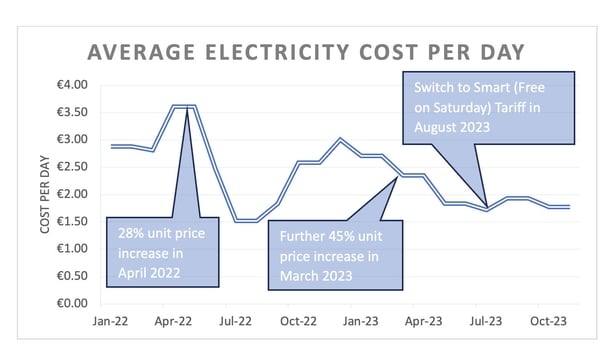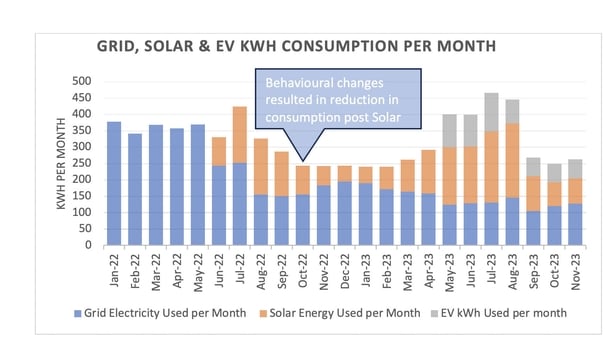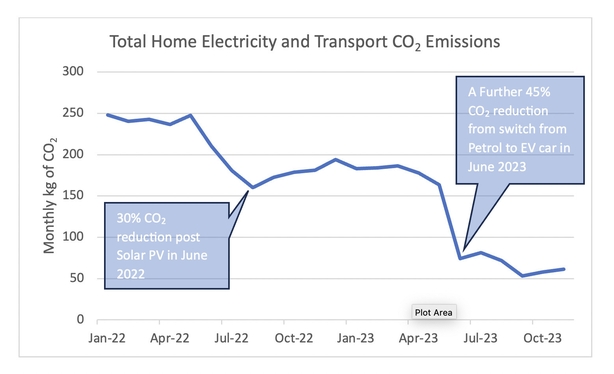Analysis: Gerald Bruton's campaign to cut energy costs and emissions involved both new technologies and behavioural change
This article is now available above as a Brainstorm podcast. You can subscribe to the Brainstorm podcast through Apple Podcasts, Stitcher, Spotify or wherever you get your podcasts.
With electricity bills doubling between late 2021 and early 2023, homeowners have come under increasing pressure to make ends meet. Where once the average annual cost of electricity was approximately €1,000 per annum, it is now routinely close to €2,000 The Government has acted to try to ease this burden with various energy credits, but this still leaves homeowners responsible for the shortfall.
Gerald Bruton is 80 years young. His journey to reduce his energy consumption began in early 2022 and was driven more by cost reduction than environmental aspirations. His house is like many others in the country, a 1970s three bedroom semi-detached located in a western residential housing estate of Cork city. Full disclosure, Gerald is my dad.
Gerald had already improved the wall and attic insulation in a bid to reduce heating oil consumption when news of the first major electricity price increase came in early 2022. Gerald's unit costs quickly went from 21c/kWh in January 2022 to 30c/kWh by April 2022 (see Figure 1).

Gerald's reaction to these substantial price increases was twofold; monitor and reduce his electricity consumption and potentially install renewable energy generation technology. He identified that the tumble dryer, electric shower and the dreaded (to Irish people anyway!) immersion heater were the ones to watch closely.
He had always been an advocate of the clothesline to dry the washing. With the tumble dryer on the banned list, he began to use the less energy intensive dehumidifier as a tool to assist his clothes drying needs, even if it did take a little longer and a bit more planning to achieve.
Gerald cut his electric shower durations to a strict 5 minutes and cut out the use of the immersion heater. These behaviour changes resulted in a 10% reduction in electricity consumption in his May 2022 electricity bill.
We need your consent to load this rte-player contentWe use rte-player to manage extra content that can set cookies on your device and collect data about your activity. Please review their details and accept them to load the content.Manage Preferences
From RTÉ Brainstorm, 5 tips to save money on your heating this winter
Buoyed by this initial success, Gerald sought quotations for solar photovoltaic (PV) panels to both provide electricity as well as hot water via a solar fed electric heating element. After research, he went for a 2.56kW, eight 320W panel system.
Due to southern aspect roof area constraints, Gerald located four panels on the southern side of the house with four others on the western side. This did slightly reduce the overall expected yield of the system by around 10%, but it did elongate the daily generation window by making use of the evening sun.
The solar PV system was installed in June 2022 with the support of an SEAI grant of €1,800. Gerald immediately saw a reduction in grid-procured electricity and the PV system delivered a 30% reduction in grid procured electricity over the course of the next year.
We need your consent to load this rte-player contentWe use rte-player to manage extra content that can set cookies on your device and collect data about your activity. Please review their details and accept them to load the content.Manage Preferences
From RTÉ Brainstorm, all you need to know about putting solar panels on your roof
One of the keys to maximising these savings was the generation of hot water via the electric heating element diversion from the solar system. This saw Gerald move from electric showers to domestic hot water system fed showers.
The solar PV system installation, coupled with the energy efficiency improvements that he made, meant that Gerald was able to navigate the further 45% increase in electricity unit costs to 44c/kWh in March 2023 without seeing a drastic increase in his monthly bills.
In early 2023, Gerald made the decision to switch from a petrol to an electric car. He received delivery of the new car in June 2023 supported by a SEAI grant of €5000. He signed up to a smart tariff, where one of the benefits was free electricity on a Saturday between 9am and 5pm (fair usage cap of 100kWh per month). Gerald has since adapted his driving behaviour in line with that of his EV, and charges it every Saturday.

Gerald has since adapted his driving behaviour in line with that of his EV, and charges it every Saturday. He is also careful not to encroach on the peak demand period between 5pm and 7pm each day where a unit cost of 57 c/kWh is charged by ensuring that he has his dinner in the oven and on the table before 5pm each day!
Gerald now remarkably consumes 20% less electricity to run his household and charge his EV per month than he did prior to beginning his energy management journey (figure 2). He is also investigating replacing his oil boiler. However, this is not straightforward due to the need to upgrade the airtightness of the house while also potentially increasing radiator areas to deliver lower temperature hot water if a heat pump is procured. He has however already seen a reduction in his monthly household electricity and transport related CO2 emissions of 75% (figure 3).

Gerald's energy management journey has many lessons. While renewable technologies have the power to assist the transition to a more sustainable future, a significant amount of behavioural change and flexibility is also required. More importantly, we can see that age is not a barrier to emissions reduction.
Follow RTÉ Brainstorm on WhatsApp and Instagram for more stories and updates
The views expressed here are those of the author and do not represent or reflect the views of RTÉ



